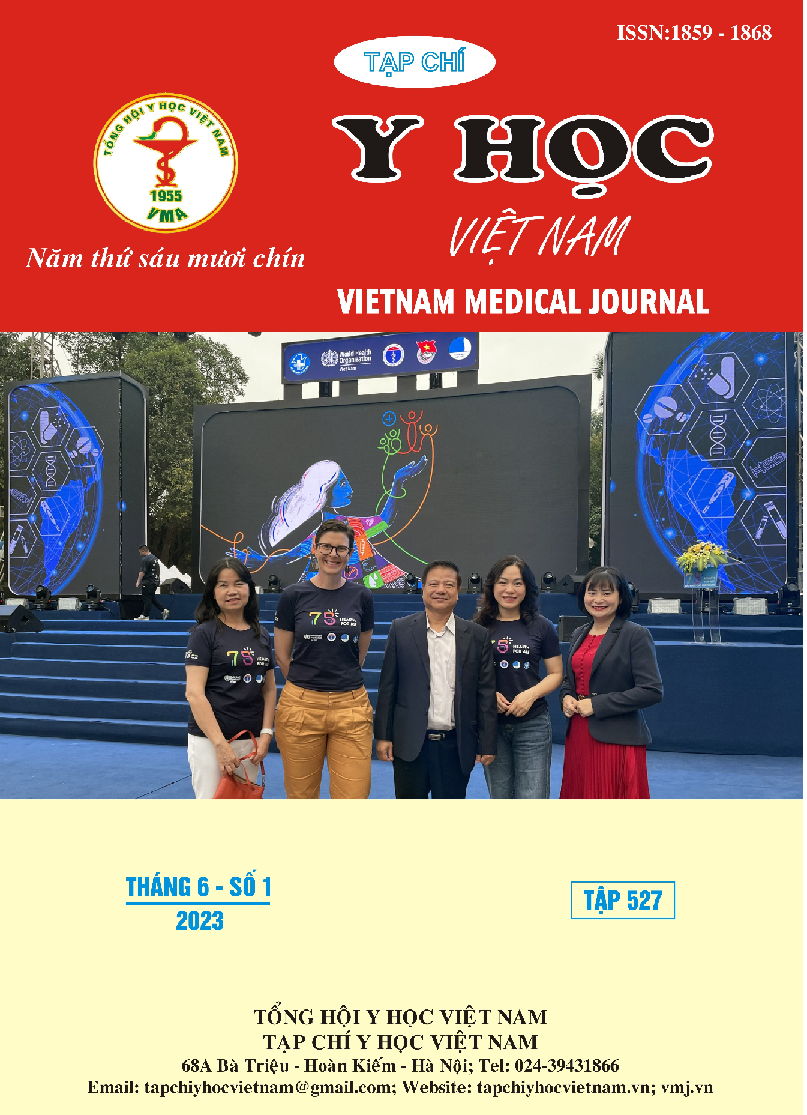TỶ LỆ SUY DINH DƯỠNG TRƯỚC PHẪU THUẬT Ở BỆNH NHÂN UNG THƯ DẠ DÀY TẠI BỆNH VIỆN ĐẠI HỌC Y DƯỢC THÀNH PHỐ HỒ CHÍ MINH NĂM 2022
Nội dung chính của bài viết
Tóm tắt
Suy dinh dưỡng trước phẫu thuật ảnh hưởng trực tiếp đến chỉ định điều trị và phục hồi của bệnh nhân ung thư dạ dày. Do đó bệnh nhân cần được theo dõi và đánh giá tình trạng dinh dưỡng sớm, nâng cao hiệu quả điều trị. Mục tiêu: Xác định tỷ lệ suy dinh dưỡng trước phẫu thuật ở bệnh nhân ung thư dạ dày theo PG-SGA tại Bệnh viện Đại học Y Dược thành phố Hồ Chí Minh. Đối tượng và phương pháp: Nghiên cứu cắt ngang trên 92 bệnh nhân ung thư dạ dày nhập viện trong vòng 48 giờ có chỉ định phẫu thuật. Kết quả: Tỷ lệ suy dinh dưỡng trước phẫu thuật ở bệnh nhân ung thư dạ dày theo PG-SGA và BMI là 68,5% và 19,6%. Có mối liên quan có ý nghĩa thống kê giữa tình trạng dinh dưỡng theo PG-SGA với trình độ học vấn, giai đoạn bệnh, albumin huyết thanh, hemoglobin, số lượng tế bào lympho/mm3. Kết luận: Tỷ lệ suy dinh dưỡng trước phẫu thuật theo PG-SGA ở bệnh nhân ung thư dạ dày khá cao. Cần tiến hành sàng lọc, đánh giá tình trạng dinh dưỡng cho bệnh nhân ung thư dạ dày, kết hợp giữa bác sĩ ngoại khoa và dinh dưỡng viên để góp phần can thiệp dinh dưỡng tốt hơn, tăng hiệu quả điều trị.
Chi tiết bài viết
Từ khóa
suy dinh dưỡng, ung thư dạ dày, PG-SGA.
Tài liệu tham khảo
2. Arends J, Bachmann P, Baracos V, Barthelemy N, Bertz H, Bozzetti F, et al., ESPEN guidelines on nutrition in cancer patients, Clinical nutrition, 2017;36(1), pp.11-48.
3. Bauer J, Capra S, Ferguson M, Use of the scored Patient-Generated Subjective Global Assessment (PG-SGA) as a nutrition assessment tool in patients with cancer, European journal of clinical nutrition, 2002;56(8), pp.779-785.
4. Fukuda Y, Yamamoto K, Hirao M, Nishikawa K, Maeda S, Haraguchi N, et al., Prevalence of malnutrition among gastric cancer patients undergoing gastrectomy and optimal preoperative nutritional support for preventing surgical site infections, Annals of surgical oncology, 2015;22, pp.778-785.
5. Guo ZQ, Yu JM, Li W, Fu ZM, Lin Y, Shi YY, et al., Survey and analysis of the nutritional status in hospitalized patients with malignant gastric tumors and its influence on the quality of life, Supportive Care in Cancer, 2020;28, pp.373-380.
6. Sung H, Ferlay J, Siegel RL, Laversanne M, Soerjomataram I, Jemal A, et al., Global cancer statistics 2020: GLOBOCAN estimates of incidence and mortality worldwide for 36 cancers in 185 countries, CA: a cancer journal for clinicians, 2021;71(3), pp.209-249.
7. WHO (2021) Viet Nam - Global Cancer Observatory, assessed on 26/11/2022, at https://gco.iarc.fr/today/data/factsheets/populations/704-viet-nam-fact-sheets.pdf.
8. Yang D, Zheng Z, Zhao Y, Zhang T, Liu Y, Xu X, Patient-generated subjective global assessment versus nutritional risk screening 2002 for gastric cancer in Chinese patients, Future Oncology, 2020;16(3), pp.4475-4483.


